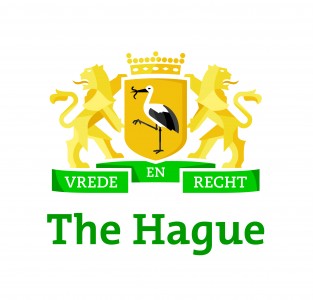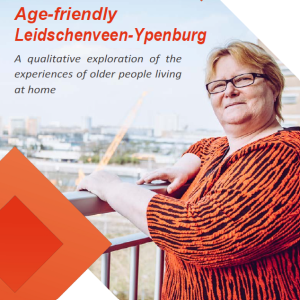Committed To Becoming More Age-Friendly
The Hague Netherlands
AFCCQ is also available for use in North Macedonia in the Macedonian and Albanian languages
 To support age-friendly cities and communities and policymaking in North Macedonia, the AFCCQ has been translated into Macedonian and Albanian, and validated by Dr Daniel Pavlovski and Dr Elisabeta Bajrami Ollogu of Mother Teresa University.
To support age-friendly cities and communities and policymaking in North Macedonia, the AFCCQ has been translated into Macedonian and Albanian, and validated by Dr Daniel Pavlovski and Dr Elisabeta Bajrami Ollogu of Mother Teresa University.
In 2020, The Hague launched the first quantitative assessment tool for measuring age-friendliness – the AFCCQ (Age-Friendly Cities and Communities Questionnaire). This instrument consists of 23-items that can assist scholars, municipalities and local authorities to collect baseline data relating to their town or city to understand how age-friendly their local community is.
In 2022, external funding was awarded by the Taskforce for Applied Research, as part of ERA-NET Cofund Urban Transformation Capacities (ENUTC) for the project – City&Co: Older Adults Co-Creating a Sustainable Age-friendly City. As a member of COST Action NET4Age-Friendly, Dr Pavlovski of Mother Teresa University joined forces of the City&Co consortium and validated the AFCCQ for use in the multi-ethnic and multi-cultural city of Skopje, the capital of North Macedonia.
The North Macedonian versions of the AFCCQ can be found here: W2404 0720 Questionnaire Macedonisch V3 and 2024 AFCCQ Albanian language.
The paper on the validation of the instrument in Skopje can be found here: How older adults experience the age-friendliness of Skopje: Results of the validation of the AFCCQ for use in North Macedonia and a representative survey – ScienceDirect
Age-friendly Cities and Communities Questionnaire (AFCCQ) available in the Romanian language
The National University of Political Studies and Public Administration, SNSPA, in Bucharest (RO) (https://snspa.ro/en/), validated the Age-Friendly Cities and Communities Questionnaire (AFCCQ) with experts and stakeholders. Additionally, a survey was performed among Bucharest’s older population. The outcomes are one of the results of the City&Co ENUTC project (https://cityco.snspa.ro/) and will be published later.
The full AFCCQ in the Romanian language can be found here: AFCCQ in Romanian language
The English AFCCQ is here: Agefriendly Cities Questionnaire
The Dutch AFCCQ is here: AFCCQ in Dutch language

Age-friendly cities research identifies four personas of older people
As an active member of the Global Network for Age-Friendly Cities and Communities, The Hague has been monitoring the progress over the years. In 2022, a second cross-sectional survey based on the Age Friendly Cities and Communities Questionnaire (AFCCQ) was conducted among 396 community-dwelling older citizens in the municipality. During times of the pandemic, scores for Social Participation went notably down, and scores for Respect and Social Inclusion increased. Based on survey data, four personas were found for the first time through cluster analysis. These personas ranged from the precariat and people with personal health issues with lower scores to the silent majority without the limitations of health problems and the upper echelon who scored positively in all domains. Age-friendly policies in The Hague should focus particularly on the first two clusters through dedicated action plans, which would help steer efforts towards those most in need of support. This would help The Hague become an age-friendly city for all, not only for those living in good health and with sufficient financial means.
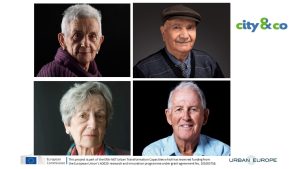
Joost van Hoof, Willeke H. van Staalduinen, Jeroen Dikken: A multi-year quantitative study of the experienced age-friendliness in The Hague: A tale of four personas. Read the full article here.
Study visit Körber Foundation
In September 2023, municipal policymakers from Germany visited age-friendly City The Hague. The Körber Foundation organised the meeting. Their mission is: Social improvements require dialogue and collaboration. The Körber Foundation tries to face the present and future challenges with operational projects, network building and strong cooperation partners. Founded in 1959 by entrepreneur and instigator Kurt A. Körber, the Körber Foundation is now active nationally and internationally with over 50 projects, collaborations and events. Around 19 million euros per year are available for charitable work. Around 150 full-time and part-time employees and around 100 volunteers are employed at the Hamburg and Berlin locations.
Expedition Age & City: The Körber Foundation´s department of Age and Demographics addresses demographic change and all relevant age issues with local, nationwide and international projects. With the annual Expedition Age & City, the Foundation invites local policymakers to explore age-friendliness in European cities outside Germany. The participants will get to know the strategic concepts of age-friendly cities and the responsible decision-makers in the administration on-site and visit forward-looking projects to receive inspiring ideas to improve the age-friendly measures of their own municipalities. Twenty-two municipal policymakers from all over Germany visited The Hauge from the 5th to the 8th of September, focusing on Third Places – meeting places for older people and their importance for an age-friendly city.
The visit has been documented in a video and can be found on YouTube here. The video provides a good impression of the different features of an age-friendly city.
Qualitative study in a neighbourhood in The Hague (2023)
The Older People’s Panel 2020 surveyed how Age-friendly the municipality of The Hague and its boroughs are. This showed that age-friendliness in the Leidschenveen-Ypenburg district scored relatively low compared to the other seven districts of the municipality of The Hague.
However, little is known about older people and their experiences behind these figures. That is why the Werkplaats Sociaal Domein, together with the municipality of The Hague and welfare organisation Wijkz, took the initiative to conduct in-depth interviews with older people living at home in Leidschenveen and Ypenburg. This report reports on the findings of the project and provides recommendations for the future.
Report available in English and Dutch
Disclaimer: The report was originally written in Dutch. The pdf has been translated by using DEEPL. The translation and pdf have only been checked on the usage of the right words, “age-friendly” and “older people/adults”.
Municipal Older People Monitor The Hague 2023 released
The municipality of The Hague considers it important to have regular access to the most up-to-date information on The Hague’s older people or older citizens. Various institutions and organisations in the city also show an interest in this. For this reason, an older people Monitor is drawn up periodically.
The monitor brings together a multitude of already available data on older people in The Hague, mainly quantitative data. The Hague has been a member of the World Health Organisation’s Age-friendly Cities network since 2015. The themes covered largely match the domains to measure and monitor the ‘age-friendliness’ of a city.
Read more: Link to the monitor in English and in Dutch
Disclaimer: The report was originally written in Dutch. The pdf has been translated by using DEEPL. The translation and pdf have only been checked on the usage of the right words, “age-friendly” and “older people/adults”.
Monitoring report Age-friendly City The Hague 2022 released
Research Age-friendly City The Hague 2022 (GB) 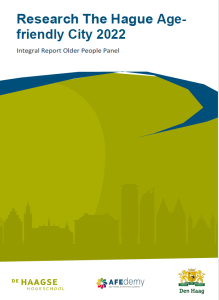
Released in October 2023, within the frame of City&Co (ERA-NET Cofund Urban Transformation Capacities), the report on the perceived age-friendliness of the Age-friendly City of The Hague (NL) by older adults in 2022. The report gives an overview of the findings and makes a comparison with the results of 2020. Additionally, the older adults responded on their motivation and attitudes toward sustainability.
The report Age-friendly City The Hague 2022 is the second measurement within the framework of the Older People’s Panel in The Hague conducted with the Age-friendly Cities and Communities Questionnaire (AFCCQ) among a representative group of older people in The Hague. The first measurement was commissioned by the Municipality of The Hague in 2020 in cooperation between De Haagse Hogeschool, Hulsebosch Advies and AFEdemy on behalf of the Vitale Stad domain, Education, Culture and Welfare Department of the Municipality of The Hague. This second measurement, funded by Regieorgaan SIA, was taken in the fourth quarter of 2022. A comparison is also made with the 2020 measurement results when reporting results.
The report was originally written in Dutch. The pdf has been translated by using DEEPL. The translation and pdf have only been checked on the usage of the right words, “age-friendly” and “older people/adults”.
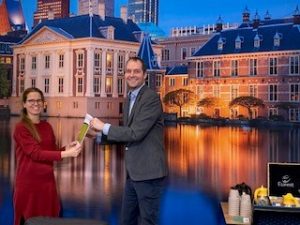
Professor Joost van Hoof hands over the report to the Director of Health, Wellbeing and Healthcare of the municipality of The Hague, Sabine Geerts (20 November 2023)
Nederlandse versie: Onderzoek Age-friendly City The Hague 2022 (NL)
Validation of the AFCCQ: full speed ahead (September 2023)

In 2020, The Hague launched the first quantitative assessment tool for measuring age-friendliness – the AFCCQ (Age-Friendly Cities and Communities Questionnaire). This instrument consists of 23-items that can assist scholars, municipalities and local authorities to collect baseline data relating to their town or city to understand how age-friendly their local community is. The original AFCCQ is available in Dutch and British English.
In 2022, external funding was awarded by the Taskforce for Applied Research, as part of ERA-NET Cofund Urban Transformation Capacities (ENUTC) for the project – City&Co: Older Adults Co-Creating a Sustainable Age-friendly City – in collaboration with the Jagiellonian University in Kraków (Professor Perek-Białas),the Wrocław University of Environmental and Life Sciences (Professor Kazak) and the National University of Political Studies and Public Administration (Dr Ivan) in Bucharest in order to cross-culturally validate the AFCCQ for use in Poland and Romania. Additionally, and concurrently, Dr Özer and her team from Istanbul Sabahattin Zaim University in Turkey were conducting the validation of the AFCCQ and the Turkish version was published in 2022.
Across the three validation sites (Poland, Romania, Turkey) to date, findings are demonstrating successful and positive insights that the AFCCQ tool can be used at a national level. This sets out the pathway to impact of this work enabling municipalities, local authorities and researchers the opportunity to measure age-friendliness in a specific area, with a view to changing strategic resources, planning and decision making to enhance the physical environment better for all residents.
Further validations have followed in 2022 across different countries. In North Macedonia, work is led by Dr Pavlovski at the University Mother Teresa in Skopje. Dr Barrie and Professor Soebarto are leading the Australian version of the AFCCQ and are based at the University of South Australia and the University of Adelaide in Adelaide, Australia respectively. All sites are aiming to validate the AFCCQ for use in the multi-cultural cities of Skopje and the Greater Adelaide Metropolitan area. Professor Ziganshina from the Kazan State Medical University has validated the AFCCQ in Tatarstan located in the Russian Federation employing an intergenerational approach.
Additional teams and collaborations have been undertaken across Europe and the Middle East. Initially, a team from Portugal, led by Dr Barata of the Instituto Superior Miguel Torga in Coimbra, is currently undertaking the validation process for the Portuguese version of the AFCCQ. And in Israel, the Hebrew version of the AFCCQ is led by Professor Ayalon from Bar Ilan University, who has collected data from four Israeli cities (Tel Aviv, Kfar Saba, Netanya, Jerusalem). Similarly, an Italian version of the AFCCQ is underway and is led by Dr Bertani of the Ca’ Foscari University of Venice. Data collection is currently underway across three Italian cities, Venice, Verona, and Naples, in order to validate the AFCCQ for use in Italy. A Great Britian and Ireland version of the AFCCQ is currently underway and led by Dr Marston from The Open University in Milton Keynes in the United Kingdom. She is conducting a nationwide validation for the AFCCQ and findings are anticipated in early 2024.
A further two more validations are being undertaken by PhD candidates: Ms. Aija Ozola of Riga Stradins University is working on a Latvian version of the AFCCQ, and Mr. Tang Linxi of Universiti Sains Malaysia is coordinating the validation of the AFCCQ for the People’s Republic of China Shandong Province.
We are excited to report that there are more countries who are expected and we invite scholars to join this consortium and joint collaboration effort to validate the AFCCQ in their country.
Reference: Özer, G. Bahçecioğlu Turan & N. Teke (2022) Agefriendly cities and communities questionnaire: A research on Turkish validity and reliability. Archives of Environmental & Occupational Health, DOI: 10.1080/19338244.2022.2061397
The Hague is partner in the newly launched ERA-NET project: City&Co
International research into age-friendly cities with a unique measuring tool
The Hague, 10 May 2022 – How age-friendly are our cities? The international City&Co project is developing measuring tools and a co-creative approach for this. The Hague University of Applied Sciences is leading this project which was awarded a substantial grant in the international ERA-NET Urban Transformation Capacities* competition. Out of 152 applications, only 16 received funding. Together with its research partners in Poland and Romania, The Hague University of Applied Sciences will investigate the age-friendliness of The Hague, Wrocław, Kraków and Bucharest.
The leader of City&Co is Joost van Hoof, Professor of Urban Ageing at The Hague University of Applied Sciences. Van Hoof says, ‘The ageing society is an international theme. Over 1,100 cities are, therefore, members of the WHO Global Network for Age-Friendly Cities and Communities. With our consortium, we are working on a reliable measuring tool for age-friendliness, in which we fully involve older people. This will provide a basis for many other cities to build on. Our ultimate goal is a local ecosystem of the over 65s, researchers and municipal employees who together make the city more age-friendly,’ van Hoof explains. ‘An internationally useful basis for collecting relevant data on age-friendliness, which will allow municipalities to govern more adequately and based on evidence. They will soon have gold in their hands!’
Measuring Age-Friendliness
The City&Co project involves the development of an innovative tool for the qualitative and quantitative assessment of the age-friendliness of cities. The basis for the first part of this tool, the Age-Friendly Cities and Communities Questionnaire, is already in place. The Hague University of Applied Sciences developed this quantitative measuring tool with partners on behalf of the municipality of The Hague. It is a list of 23 questions covering areas such as housing, social participation, healthcare facilities and one’s financial situation. Van Hoof says, ‘We will translate and adapt this list for use in Poland and Romania. Then we will apply the questionnaire in The Hague, Wrocław, Kraków and Bucharest. We expect the ratings at the end of this year.’
Four cities, four contexts
With the Polish-Romanian-Dutch collaboration, the project team is laying a foundation that can be used in many countries. They work in Slavic, Romance and Germanic languages, which means that the questionnaires and tools will soon be easy to translate into German and Italian, for example. In addition, the differences between the countries are quite black and white. Van Hoof says, ‘We question the domains that the municipality has influence over, and which are relevant. In the Netherlands, for example, these are public transport and the coordination of services for older people with a migrant background, but that is different in Poland and Romania. That is why we tailor the measuring tool to the local context. For this “translation”, we, the project team, will make a manual.’ The measuring tool is unique. The World Health Organization (WHO) validated the tool for measuring age-friendliness of cities.
Innovative tool
In 2023, the project will continue with a qualitative method to measure the perceived age-friendliness in the four cities. Van Hoof says, ‘Together with people aged 65 and over, we are developing a mobile website, a portal, where they can post pictures and messages about the age-friendliness of the area. That will enable us to collect data, from which we derive insights that we link to the rating of a neighbourhood or district. The next step is a qualitative approach for joint decision-making and co-creation of policies with municipalities and actions at neighbourhood level. In doing so, we offer tools to work on age-friendliness. A great project for us as a university of applied sciences in a UN city.’
*The project is funded by the ERA-NET Cofund Urban Transformation Capacities (ENUTC) Call, within the framework of the European Commission’s Joint Programming Initiative Urban Europe.
 AFCCQ Good practice Age-friendly World
AFCCQ Good practice Age-friendly World
On April 14th, 2022, Age-friendly World, Department of Ageing and Life Course of the World Health Organization published the Age-Friendly Cities and Communities Questionnaire (AFCCQ) as a good practice in the Global Database. https://extranet.who.int/agefriendlyworld/afp/the-age-friendly-cities-and-communities-questionnaire-afccq/
The AFCCQ is a validated instrument to test the age-friendliness of a city or community by older adults themselves. The questionnaire consists of 23 questions covering the eight age-friendly city domains and an extra dimension on financial aspects.
The AFCCQ has been validated in The Hague in 2020. In 2022 the instrument will be used again to test the age-friendliness of the City of The Hague. The AFCCQ will be translated and culturally validated in Polish and Romanian language and tested in the cities of Wroclaw, Krakow (PL) and Bucharest (RO) as part of the Eranet UTC project City&Co. City&Co (2022-2024) is coordinated by The Hague University of Applied Sciences, Lectorate Urban Ageing, prof. dr. Joost van Hoof.

How safe and secure is The Hague in the eyes of older citizens? Results of a qualitative study
In March 2022, the results of a set of focus group sessons that were conducted on the sense of safety and security of older people were published.
The sense of safety and security of older people is a widely acknowledged action domain for policy and practice in age-friendly cities. Despite an extensive body of knowledge on the matter, the theory is fragmented, and a classification is lacking. Therefore, a study was conducted by partners of the Knowledge Platform Age-Friendly The Hague, namely The Hague University of Applied Sciences, AFEdemy—Academy on age-friendly environments in Europe, Hulsebosch Advies and Leiden University/Leiden University of Applied Sciences.
The study investigated how older people experience the sense of safety and security in an age-friendly city. A total of four focus group sessions were organised in The Hague comprising 38 older people.
Based on the outcomes of the sessions, the sense of safety and security was classified into two main domains: a sense of safety and security impacted by intentional acts and negligence (for instance, burglary and violence), and a sense of safety and security impacted by non-intentional acts (for instance, incidents, making mistakes online). Both domains manifest into three separate contexts, namely the home environment, the outdoor environment and traffic and the digital environment.
In the discussions with older people on these derived domains, ideas for potential improvements and priorities were also explored, which included access to information on what older people can do themselves to improve their sense of safety and security, the enforcement of rules, and continuous efforts to develop digital skills to improve safety online.
This article is published as an open access paper, which means that it can be read and downloaded free of charge. Direct access to the article: https://www.mdpi.com/1660-4601/19/7/3960

How age-friendly is The Hague? Results of a quantitative study
In February 2022, the results of the 2020 evaluation of the age-friendliness of The Hague were published in the Elsevier journal Cities as an open-access paper.
Measuring the age-friendliness
The municipality of The Hague has been a member of the WHO’s Global Network for Age-Friendly Cities and Communities since 2015. The municipality commissioned a survey to investigate how older citizens view the age-friendliness of their city. A cross-sectional survey was conducted among a diverse sample of 393 community-dwelling older citizens. The survey made use of the Age-Friendly Cities and Communities Questionnaire (AFCCQ), and multilevel regression techniques to investigate how social groups differ on the domains of the AFCCQ. This questionnaire had been developed in early 2020 by Dr. Jeroen Dikken and colleagues and provides a valid instrument for measuring the age-friendliness of the city.
The overall scores of the age-friendliness of The Hague were satisfactory
The Hague scored a satisfied as an overall score (16.9 ± 8.87), and a satisfied on social participation (2.6 ± 2.46), civic participation and employment (1.4 ± 1.34), communication and information (1.4 ± 1.32), respect and social inclusion (1.6 ± 1.59), community support and health services (2.7 ± 2.79), transportation (1.7 ± 1.26) and financial situation (1.9 ± 1.26). The Hague has an above-average score in the field of housing (2.4 ± 1.06). For Outdoor spaces and buildings, the municipality scores a moderate positive score (0.9 ± 1.41).
Multilevel regression techniques were used to investigate how social groups differ
Significant differences were found for sex, age, socio-economic position, receiving care support, and use of mobility aids. The findings show that older people have different perceptions regarding their city’s age-friendliness. Policymakers must acknowledge this heterogeneity among their older citizens and adapt city policies accordingly.
In 2022, a follow-up is planned as part of a larger cohort study in The Hague.
Further reading: van Hoof, J., van den Hoven, R.F.M., Hess, M., van Staalduinen, W.H., Hulsebosch-Janssen, L.M.T., Dikken, J. (2022) How older people experience the age-friendliness of The Hague: A quantitative study. Cities 124: 103568 https://doi.org/10.1016/j.cities.2022.103568. How older people experience the age-friendliness of The Hague: A quantitative study – ScienceDirect
Ten questions concerning age-friendly cities and communities and the built environment published
In April 2021, a Ten Questions paper entitled “Ten questions concerning age-friendly cities and communities and the built environment” was published in the Elsevier journal Building and Environment.
Over the past decade, a multitude of age-friendly initiatives have been developed with the aim of making physical and social environments more favourable for older people’s well-being, health and ability to live in the community. This extensive article explores ten key questions associated with the age-friendly cities and communities’ movement, with a particular focus on the built environment and relevant technologies. It provides an overview of the history of the age-friendly cities’ movement and the underlying models, the aspects of the built environment that are relevant for age-friendly cities, the ways age-friendliness can be evaluated, and the interactions between age-friendly cities initiatives and other strategic agendas such as smart cities. The paper concludes by discussing future perspectives and possible directions for further development of the age-friendly movement.
The paper was authored by Prof Joost van Hoof (The Hague University of Applied Sciences and Wrocław University of Environmental and Life Sciences), Dr Hannah R. Marston (The Open University, Milton Keynes), Associate Professor Jan Kazak (Wrocław University of Environmental and Life Sciences) and Dr Tine Buffel (The University of Manchester).
The Hague, Wrocław and Manchester are among over 1100 cities which joined the Global Network for Age Friendly Cities and Communities of the World Health Organization. These cities follow a 5-year cycle of planning, implementation and evaluation. In conclusion, the Ten Questions paper provides ten steps to achieve an age-friendly cognizant environment, which can help cities in planning for and evaluating the quality of the built environment and technology.
This article is published as an open access paper, which means that it can be read and downloaded free of charge. Direct access to the article: Ten questions concerning age-friendly cities and communities and the built environment – ScienceDirect
Translated Municipal Action Programme Senior-friendly The Hague 2020-2022
Please find below the unofficial translation in English of the municipal Action Programme 2020-2022.
Unofficial translation Actieprogramma Seniorvriendelijk Den Haag 2020-2022 en-GB
Special Issue about Age-friendly Cities published
In Februa ry 2021, a Feature Paper Special Issue entitled “Age-Friendly Cities & Communities: State of the Art and Future Perspectives” was published in the International Journal of Environmental Research and Public Health. This special issue features 30 contemporary contributions which relate to the Age-Friendly Cities and Communities initiative launched by the World Health Organization in 2007. Two of these contributions deal with research conducted in The Hague, namely the development of the Age-friendly Cities and Communities Questionnaire, and making documentaries with older people about their age-friendly living environment.
ry 2021, a Feature Paper Special Issue entitled “Age-Friendly Cities & Communities: State of the Art and Future Perspectives” was published in the International Journal of Environmental Research and Public Health. This special issue features 30 contemporary contributions which relate to the Age-Friendly Cities and Communities initiative launched by the World Health Organization in 2007. Two of these contributions deal with research conducted in The Hague, namely the development of the Age-friendly Cities and Communities Questionnaire, and making documentaries with older people about their age-friendly living environment.
Picture @GetOud, The Hague
The key focus of this Special Issue is to provide a critical assessment and overview of the state of the art within the Age-friendly Cities arena. Published papers include an editorial, seven papers focusing on age-friendly neighbourhoods, cities, communities, and societies, three papers explore innovative approaches to housing, two papers concentrate on age-friendly transportation, four papers focus on innovative practices in the domain of cure and/or care for older citizens, four papers relate to respect and social inclusion, and nine papers focus on and consider the use and implementation of technology in an age-friendly city or community.
As a take home message, the guest editors, Prof Joost van Hoof (The Hague University of Applied Sciences and Wrocław University of Environmental and Life Sciences) and Dr Hannah R. Marston (The Open University, Milton Keynes) would like to emphasize the need for greater collaboration between disciplines in order to create a truly multisectoral actions for making our cities age-friendly for all generations. According to Prof Van Hoof, who also serves as the chairperson of the Knowledge Platform Age-friendly The Hague, “the contents of this Special Issue is one of the ways to expand and disseminate knowledge and to facilitate the actual age-friendly agenda and narrative further. Therefore, the contents of the total special issue may help other cities and communities on their way.”
All papers are published as open access papers, which means that they can be read and downloaded free of charge. Direct access to the special issue: https://www.mdpi.com/journal/ijerph/special_issues/Age_Friendly_Cities
Monitoring age-friendliness of The Hague 2020
Overall, the older citizens of The Hague value the age-friendliness of their city as well sufficient. They give high scores to their own homes; outdoor spaces and buildings on the contrary score significantly lower. People in the situation of having a lower income, health and mobility issues are less satisfied. These are the main outcomes of the monitoring assessment of the age-friendliness of The Hague, valued by The Hague older adults in the age-group of 65 years and above.
On January 29th, 2021, professor Urban Ageing of The Hague University of Applied Sciences, Joost van Hoof, handed over the report on the monitor of Age-friendliness of the City The Hague to the City Executive Kavita Parbhudayal. The report is the result of the joint activity of the Knowledge Platform Senior-friendly The Hague, that involves among others scientific and educational institutions, welfare organisations, businesses, older people’s council and public health administration.
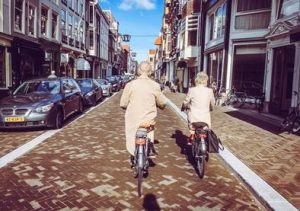
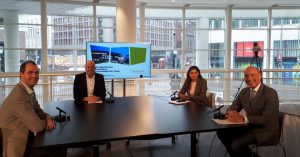
From left to right: professor Joost van Hoof, chair Johan Overdevest, city executive Kavita Parbhudayal, chair older people’s council The Hague Gert van Capelleveen
Further reading (in Dutch only) Platform Seniorvriendelijke Stad Den Haag – De Haagse Hogeschool
The Age-Friendly Cities and Communities Questionnaire launched in The Hague
In early 2020, the municipality of The Hague awarded the consortium consisting of The Hague University of Applied Sciences, Hulsebosch Advies and AFEdemy to develop a questionnaire and run a representative survey on the perceived age-friendliness of the city among its older citizens. Part of this survey was the development of a validated questionnaire, which allows for an assessment of the perceived age-friendliness. In order to do justice to the superdiversity of the population of The Hague, the municipality also wanted a representative number of older Western and non-Western immigrants to be included in the sample.
The consortium started to review scientific and public sources to check whether a default questionnaire was already available. The search delivered several examples of questionnaires that either lacked transparency on the development and validation or did not measure the construct of age-friendliness as a whole. This made the consortium decide to develop and validate a validated questionnaire, coined the Age-Friendly Cities and Communities Questionnaire.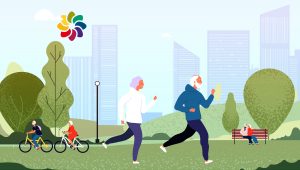
In order to develop the questionnaire, the consortium made use of the Consensus-based Standards for selection of health Measurement Instruments (COSMIN). The development consisted of the following four phases: Development, Initial validation, Psychometric validation and Instrument translation.
The theoretical basis of the questionnaire was the Global Age-friendly Cities Guide, published by the World Health Organization in 2007, and its accompanying Checklist. This guide published a model of age-friendly cities and communities, consisting of eight domains: outdoor spaces and buildings; transportation; housing; social participation; respect and social inclusion; civic participation and employment; communication and information; and community support and health services. The features of the Checklist formed the foundation of the items for the questionnaire. Additionally, questions on technology and the financial situation were added based on the literature review.
After several rounds of validation by different panels of regional, national and international experts and checks on the readability, a questionnaire of 64 items remained that was launched as online survey or questions for a telephone enquiry. On top of the 64 questions on age-friendliness, an extra set of demographic and policy requested questions were added. In the months June-September 2020, a number of 384 respondents of 60 years and over filled out the questionnaire. Some characteristics: 51% female, 74.4 is the average age, 59.9% home owners, 48.4% living with chronic conditions and 14.6% using a wheeled walker or wheelchair.
Based on the responses, the consortium performed a Confirmatory Factor Analysis as part of Step 7 of the COSMIN protocol (see figure below) to check the relevance and internal consistency of the questions. This finally led to 23 remaining questions that are valid to measure the entire construct of an age-friendly city. The 23 questions have been translated from Dutch into English.
The Age-Friendly Cities and Communities Questionnaire measures the views of older adults on the eight domains already defined by the WHO and on a relevant ninth domain, namely their own financial situation. The questionnaire is open for use on every geographical level and by every public authority, civil society organisation or any other who is interested. It might be necessary to culturally validate the questionnaire.
For further reading and contacts: https://www.mdpi.com/1660-4601/17/18/6867/pdf
Reference: Dikken, J. van den Hoven, R.F.M., van Staalduinen, W.H., Hulsebosch-Janssen, L.M.T., van Hoof, J. (2020) How older people experience the age-friendliness of their city: Development of the Age-Friendly Cities and Communities Questionnaire. International Journal of Environmental Research and Public Health 2020;17(18):6867 doi: 10.3390/ijerph17186867
The Age-Friendly Cities and Communities Questionnaire (AFCCQ) in English and Dutch
All Questions of the AFCCQ Can Be Answered on a 5-Point Likert-Scale Ranging from: −2 (Totally Disagree); −1 (Disagree); 0 (Neutral); 1 (Agree); 2 (Totally Agree). Q7 and Q8 should be recorded in the opposite direction.
Housing
Q1 My house is accessible to me.
Q2 My house is accessible to the people who come to visit me.
Social participation
Q3 There are enough opportunities to meet people in my neighbourhood.
Q4 Activities and events are organised in places that are accessible to me.
Q5 The information about activities and events is enough for me and also suitable for me.
Q6 I find the range of events and activities sufficiently varied.
Respect and Social inclusion
Q7 * I sometimes get annoying or negative remarks because of my age.
Q8 * I sometimes face discrimination because of my age.
Civic participation and employment
Q9 I have enough opportunities to interact with younger generations.
Q10 I feel like a valued member of society.
Communication and information
Q11 Printed and digital information from the municipality and other social institutions is easy to read in terms of font and size.
Q12 Printed and digital information from the municipality and other social institutions is written in understandable language.
Community support and health services
Q13 The supply of care and welfare in my city is enough for me.
Q14 When I am ill, I receive the care and help I need.
Q15 If necessary, I can easily reach care and welfare services by telephone and in person.
Q16 I have enough information about care and welfare services in my neighbourhood.
Q17 Care and welfare workers in my neighbourhood are sufficiently respectful.
Outdoor spaces and buildings
Q18 My neighbourhood is sufficiently accessible for a wheeled walker or wheelchair.
Q19 The shops in my neighbourhood are sufficiently accessible with a wheeled walker or wheelchair.
Transportation
Q20 I can easily get on the bus or tram in my neighbourhood.
Q21 The bus and tram stops in my neighbourhood are easy to reach and use.
Financial situation
Q22 My income is sufficient to cover my basic needs without any problems.
Q23 I live well on my income
Pdf with questionnaire in English: W2009 0640 SWE vragenlijst ENG Age-Friendly Cities_HR
Pdf with questionnaire in Dutch: W2009 0640 SWE vragenlijst NL Age-Friendly Cities_HR
2020: Monitor age-friendly city The Hague
In March, the municipality of The Hague assigned the consortium of The Hague University of Applied Sciences (professor Joost van Hoof, Urban Ageing), Hulsebosch Advies (Loes Hulsebosch) and AFEdemy (Willeke van Staalduinen) to develop and perform a Monitor Age-friendly City The Hague in 2020.
The monitor will make use of qualitative and quantitative research methods, to investigate the current state of The Hague as age-friendly city in general and will include more specific themes. A cooperation platform will be build of partners who advocate the interests of older adults or who will contribute to reflect on the monitor.
The monitor will result into an advisory report to the municipality. Relevant global, national and local trends and appropriate other research results will be part of the advisory report. 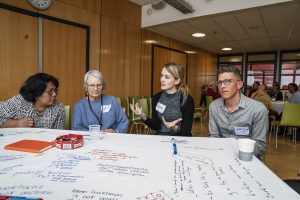
The main tasks of the consortium will be to define the specific themes of age-friendly city The Hague in close cooperation with older adults and civil servants. The consortium will develop a methodological framework of indicators for research and will provide the additional questionnaire. Focus group meetings will be held and about 500 older adults from The Hague will be interviewed taking into account the diversity of the older population in The Hague.
The initial planning is to deliver the report on November 30th of 2020. With regard to the current outbreak of CoVID-19 it is considered how to deal with these circumstances.
(picture is from samenkracht.nu)
2020: Older adults in The Hague choose the location of new benches
The Hague recently installed sixteen new benches across the city. They have been placed at those locations according to the wishes of older adults and people with disabilities. 38 existing benches got arm rests. The installation of benches is to support less mobile older adults who in this way can continue their daily walks if they have benches to rest upon.
The installed benches are based on the design of Mr. Van Alff, who worked until 1960 as head of urban parks in The Hague. The benches are made of wood. The seating surface is higher so that people more easily can sit down and stand up again.
Read the article (in Dutch only): city journal The Hague
2019 and 2020: Training older adults to advocate age-friendly environments
In 2019, the Municipality of The Hague was actively involved in the Erasmus+ AFE Activists project (www.afe-activists.eu). This Erasmus+ project aims to train older adults to advocate age-friendly environments in their own community. To achieve this goal, the project developed an advocacy training curriculum and organized a study visit to age-friendly city The Hague (October 7th-11th 2019).
The municipality hosted the study visit of 11 older adults from Lithuania, Germany, Austria and Italy to The Hague. The group visited several locations in The Hague, such as the iZi demonstration house (see pictures), community centres, library and SportCampus. Also they followed lectures and presentations from the municipality and The Hague University of Applied Sciences, Urban Ageing. In March 2020, a new delegation of older adults (including people from The Hague Older People’s Council) will visit Age-friendly City Udine in Italy.

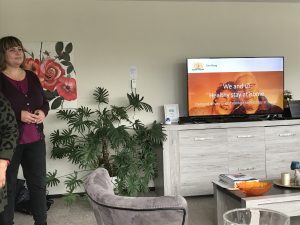
Besides the study tour, the municipality of The Hague was the decor of the training of a group of 10 older people in local neighbourhood Transvaal in the frame of the AFE-Activists project. The training was provided by project partner AFEdemy BV. The learners actively worked on the concept of age-friendly environments, methods of advocacy, identifying local neighbourhood needs and creating an action plan. The plan is to broaden the group of participants and to install a neighbourhood older adults’ council. The council can be consulted by the municipality and other parties to better formulate local policies.
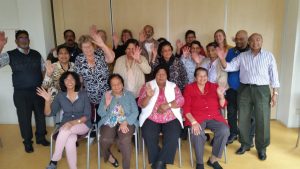
2019: Magazine OldGold (BladGoud) of The Hague 4 years age-friendly city has been released and translated into English
The Hague has been a member of the age-friendly city network for four years now and this seemed a good moment to make up the balance to provide a starting point for the new period. We do this with: OLD GOLD. The name says so much: a rich colour, something precious and attractive – and OLD. It is a magazine which is all about older people. Specifically the older people who live in The Hague!
You can read about what The Hague has done for seniors in the previous years. You find articles about other age-friendly cities around the world such as New York and Bangalore. You can find reports from 30 group discussions that around 500 people took part in during high teas; a look back over four years of Age-Friendly City The Hague; portraits of eight active and inspiring people living in various parts of The Hague who add to their own enjoyment of life every day as well as that of others, and much more. We hope you enjoy reading OldGold!
You can download the magazine here
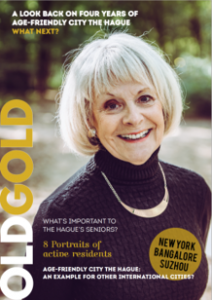
2018: New City Executive: Dignified ageing in senior-friendly The Hague
After the local elections in March 2018, a new board of the City Council was elected and appointed. New city executive for Age-friendly The Hague has become Kavita Parbhudayal. She also announced to focus on digital innovation to ensure and achieve health and liveability for The Hague’s residents (article in Dutch).

2017: The Hague Age-Friendly City Conference, 2-4 October
Alderman Karsten Klein hosted the Age-Friendly City Conference on innovation, health and active ageing. He welcomed the many international guests in his foreword and speech: “As city executive we work closely with our residents, volunteers and businesses to create the ideal environment to promote the vitality, independence and social engagement of the people of The Hague. We drive this process in part with the use of technology and other innovations.” In The Hague Conference Guide is presented the city’s residents view on what The Hague means to them as Age-friendly city.
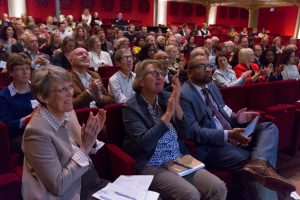
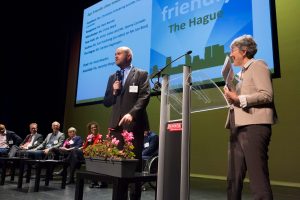 Photos: Valerie Kuypers
Photos: Valerie Kuypers
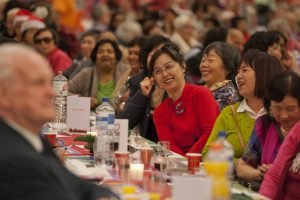
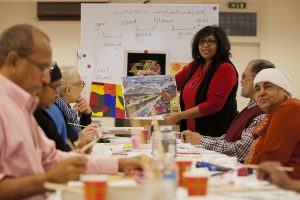 Photos: D’Article Enterprise
Photos: D’Article Enterprise
Joint Action six cities
During the conference representatives of the cities of New York (USA), Bangalore (India), Suzhou (China), Manchester (UK) and Frankfurt (Germany) cooperated with The Hague on 6 major themes regarding Age-friendly environments:
- Diversity
- Vitality
- Older people’s participation
- Ageing population
- Accessibility
- Support and independent living with ICT
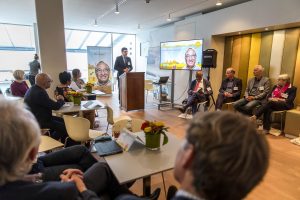 Photo Valerie Kuypers
Photo Valerie Kuypers
The cities jointly identified the opportunities they share for above mentioned themes to the future of Age-friendly cities. They reached specific agreements to advance these opportunities together as trailblazers in the context of the existing WHO and Covenant on demographic change networks by working together as municipalities, businesses, residents and other professionals in the field. Finally they agreed to share these opportunities and to combine expertise originating from widely differing backgrounds with other cities in these same networks.
2016-2017: The Hague Age-friendly activities
Ageing vitally in the Age-friendly city. Every citizen of The Hague should have the opportunity to live as independently as possible and be able to participate in the community. Most people can live independently and do so without assistance, but due to old age, illness or a handicap at times it can be difficult. In 2016 the municipality of The Hague presented the results of the research on the eight domains of Age-friendly city life of the WHO.
To make the findings of the research “what do senior citizens find important in order to stay vital“ clear, the results have been turned into an infographic. Based upon the findings, additional research was done resulting in a district’s score being better or worse than others and the action program “The Hague Age-friendly City” was initiated.

To read more about what’s important to senior citizens of The Hague, please follow the link. Infographic The Hague Age-friendly City.
The Action Plan of municipal policy is based on three priorities:
- Improve vitality
- Reduce loneliness
- Encourage and facilitate continuous living in your own environment (instead of care facilities)
Essential in implementing these priorities is that The Hague doesn’t have a top-down approach, but tries to motivate the (senior) citizens and organisations of The Hague to have a particular role in this. As a local government The Hague tries to create an environment that encourages our citizens to take initiative and responsibility. Through partnerships with corporations, small and medium enterprises, and organisations, the municipality of The Hague creates alliances on specific themes. We facilitate these alliances through financial means from the municipality and our partners. Bottom line in every project or activity concerning the elderly is that it has to meet the needs and preferences of the senior citizens in The Hague.
Concrete actions are:
Vitality Award: The Vitality award is an award of appreciation for initiatives of citizens of The Hague to work towards a senior-friendly city. The Vitality award stimulates citizens of The Hague (both local residents and organizations) to be actively involved with the city. With your initiatives you inspire each other to remain vital and to combat loneliness. The initiatives, provided they are workable, may vary from small to large and must be applicable to a variety of themes such as: social restaurants, coaching in using new media or safe online payments, dementia-friendly shops but also ideas about the use of internet, a senior-friendly walking area or a walking buddy in the neighbourhood.
Prior to the award ceremony, gatherings in each city district are organized during which the submitted initiatives are presented and discussed. Also ideas that need some help from other parties, can be submitted. The Vitality ward brings together various parties from which collaborations may be formed.
With the help of good ideas and great initiatives the municipality can improve the liveability of the city even more. The Vitality award is presented in each city district to organizations or local inhabitants who develop initiatives to be active and involved with the city.
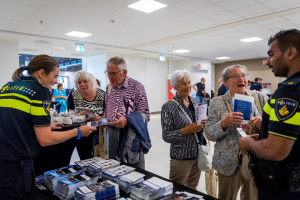
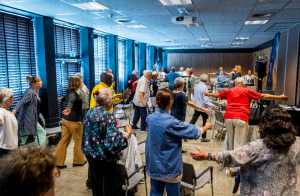
Veilig Vitaal (Safely vital) Photos: D’Article Enterprise
Month of Vitality: The Month of Vitality is a theme specifically aimed at senior citizens to participate and stay active. All sorts of activities are organized by various companies and organizations throughout the city. The activities they organize are described on the “Month of Vitality” website [www.maandvandevitaliteit.nl] and in a special festival newspaper insert. During the Month of Vitality, partners of the city and local organizations are called upon to organize activities for senior citizens. These activities can include sports, cultural activities or activities that stimulate senior citizens to be an active part of their communities such as classes that teach them how to use smart devices such as tablets and smartphones.
Common in The Hague: The platform ‘Common in The Hague’ [Doodgewoon in Den Haag] considers it essential that citizens of The Hague make conscious decisions with regards to the last phase of their lives. The objective of ‘Common’ is to expand the possibilities of dying a dignified death by the citizens of The Hague. The platform stimulates ‘becoming the director of your last stage of life. In collaboration with organizations in the field of healthcare and end-of-life care services, the platform wants to increase the awareness of this theme among the citizens of The Hague. And subsequently break the taboo regarding dying and death. The Platform ‘Common in The Hague’ is a connecting link between all institutions that offer services to citizens of The Hague concerning death.
Furthermore, the platform wants to reinforce the network of such institutions and optimize the collaboration.
Among the actions performed by the platform are the recording of life stories of people during their last stage of life, an activity which is performed by younger citizens. This happens during gatherings where people eat and talk to each other, such as several locations of Resto VanHarte. These life stories form a source of inspiration for events that are organized by the Platform ‘Common in The Hague.’
Golden plates: The Golden Plates [Gouden Bordjes], is an appreciation for excellent provision of meals in the elderly care. Among others, in accordance with the principle for the elderly by the elderly but also in cooperation with professionals of various professional backgrounds.
The Golden Plates are meant to continuously inspire institutions to improve the offer of meals. The Golden Plates started as an initiative in 2011 and celebrated its fifth anniversary in 2016 in cooperation with those that are active in the health care industry of The Hague and Deputy Mayor and Alderman Karsten Klein (Economic Affairs and Healthcare) and other professionals.
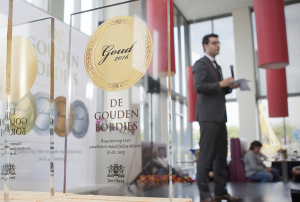 Photo: D’Article Enterprise
Photo: D’Article Enterprise
In 2012 the Golden Plates was granted the acknowledgment “Good Practice & Idea” by Genero. Genero (cooperation partner of Erasmus Medical Centre, Rotterdam-Rijnmond region) regards the Golden Plates as a support of the improvement of health care and welfare for senior citizens. The set-up of the Golden Plates aims at activities with regards to meals that in time will lead to an integral supply of care and support. Which then aims at an improvement of self-reliance. This also helps in combatting loneliness among senior citizens because it increases the number of opportunities for getting in touch with other senior citizens, in an attractive environment with good service.
Community against loneliness: As part of the ‘Community against Loneliness’ [Community tegen Eenzaamheid] various parties in The Hague look for solutions to combat loneliness. This results in surprising collaborations between organizations, companies and citizens. In December 2015, the green light was given to the Community against loneliness, during a Christmas lunch with 800 senior citizens on the Pier of Scheveningen.
The Community against Loneliness started as a collaboration of entrepreneurs, professionals and volunteers, who were all looking for chances and opportunities to combat loneliness. In recent past coalitions were created between ADO Den Haag (local soccer club), Xtra(welfare), Pathé cinemas, Buddy Network, Resto VanHarte, and migrant senior citizens. As this is only the beginning. The Community against Loneliness of The Hague is more to than meets the eye, and unexpectedly brings together people and organizations while adding brilliance to life.
Diverse The Hague: The Hague is a diverse city where citizens feel recognized and play a role which suits them. This ideal connects organizations that are active in advocacy, community service, sports, welfare, healthcare, education and government.
Staff members, volunteers and persons in need of care ask themselves: what does this mean for our organizations, what does it mean to me, what is needed to do that, who is of importance to do this?
Since 2009 these organizations have gone around with each other within Diverse The Hague [Divers Den Haag]. A lot has been accomplished already: organizations increasingly draw clients with diverse backgrounds, and services are more tailored to a diversity of people in the city. An increasing number of staff with a diversity of backgrounds find positions within these organizations. Knowledge and know-how is growing and within organizations a stronger and broader awareness for the need of connecting and staying connected at all levels in the ever changing city, is growing.
Hence, Diverse The Hague works on broadening both the number of organizations and their level of knowledge on the subject matter. Thus promoting the dialogue between organizations and people, both on the inside and out.
 Photo Divers Den Haag
Photo Divers Den Haag
Cultural Canvas: Cultural participation of senior citizens forms an integral part of our policy as a senior-friendly city. Cultural participation does not only contribute to participating independently and actively in society. It also provides more possibilities to deliver tailor-made work and make connections between welfare organizations, healthcare providers on the one hand and cultural institutions on the other hand. To implement the above mentioned, we use our self developed Cultural Canvas. The Cultural Canvas is a triptych which is used by our partners to further promote cultural participation.
The triptych consists of the following: • What do senior citizens of The Hague consider important with regards to arts and culture; • A sufficient amount of inspiring examples; • What can healthcare, welfare and cultural institutions do to inspire senior citizens to do more with arts and culture.
Dementia Community Centres: The policy in The Hague also pays more attention to the support of vulnerable senior citizens who have problems with structure in their daily life. This at times combined with the symptoms of dementia requires that their informal caregivers provide them with activating daytime activities and social networking opportunities. In recent years dementia meeting places have been setup by healthcare and welfare providers as initiated by the municipality. In addition the city has setup day care facilities for senior citizens. In the next few years some of these facilities, as listed below, will be further developed. This is necessary because of the increasing number of independently living senior citizens with issues ranging from lack of a daily structure through dementia.
Facilities that require further development are:
• A close-knit network of day care centers in their own neighborhood where senior citizens and their informal caregivers can ask for support, coaching, and use of day care facilities in their nearby surroundings
• Centers where informal caregivers can count on contact with fellow sufferers and respite care.
 Photo: Geheugensteunpunt
Photo: Geheugensteunpunt
2015: The Hague became a member of GNAFCC as first city of the Netherlands
Recent policy has focused on the domains participation, support and care. The participation element has been particularly successful in ensuring that more elderly people continue to take part in society or helping the elderly enjoy meaningful activities and engage them. The support element has helped those who require support among our ageing population to receive the right care and information on time. Through the care element, we have promoted systematic attention for the problems of intramural clients in healthcare institutions, focused more on dementia sufferers and devoted attention to the process of dying and the meaning of life. The elderly must be able to play an active role in society for as long as possible. This is primarily their responsibility, but where necessary the municipality offers support, help and care.
Because the elderly wish to live independently in their own living environment for as long as possible and maintain control over their lives for as long as possible, we wish to help the elderly remain vigorous for as long as possible. By focusing our policy on promoting a vigorous ageing population, it is not only important to know what we mean by vigorous, but also what the elderly need in order to be vigorous. Vigour will partly depend on the individual person. However, the physical environment of the elderly and their place in society can also play a role.
The Hague is the first city in the Netherlands to join the WHO Global Network of Age-friendly Cities and Communities. An age-friendly city adapts its structures and amenities to make them accessible to an ageing population with different needs and possibilities.The elderly know best what being vigorous means for them and what they need to remain vigorous. They formulate the conditions for remaining vigorous themselves. We involve the elderly in the municipal senior committee, we organise a senior citizen panel as well as group discussions. The WHO framework for Age-friendly Cities helps the elderly formulate the conditions for remaining vigorous. Based on the information provided by our elderly citizens, we focus on developing a structural programme: ‘The Hague, city for vigorous senior citizens’.


